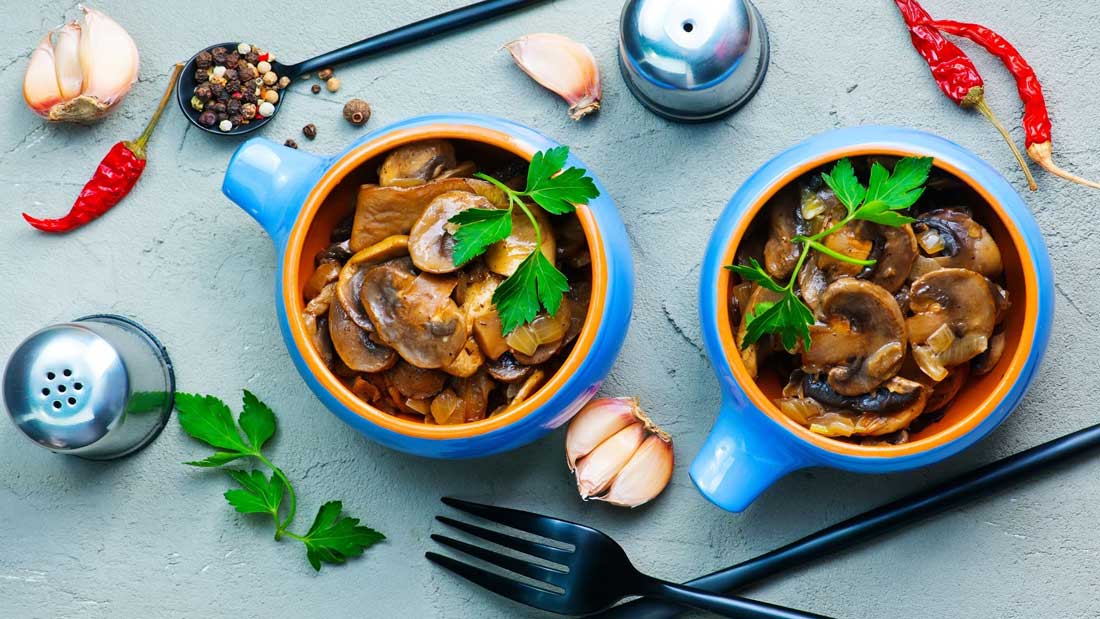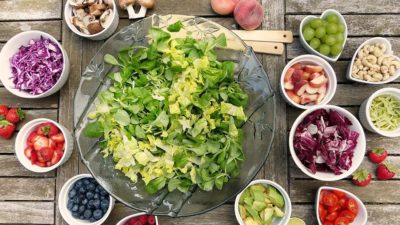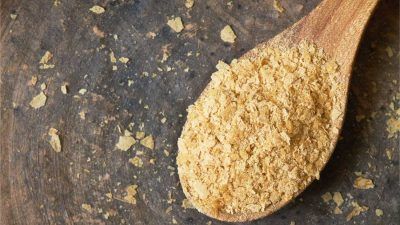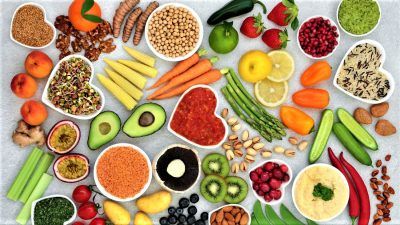The magic of mushrooms

Truly unique among all foods – mushrooms have a lot to offer
Neither plant nor animal, mushrooms are a uniquely different type of organism. They belong in the fungi kingdom, along with yeast and mould and their anatomy is very different to plants. Generally low in fat, they contain fibre, protein and several minerals and vitamins, including copper, selenium, potassium, magnesium, zinc and a number of B vitamins. Mushrooms also contain some very specific antioxidants that help to reduce inflammation and protect our cells from damage.
Texture champions
Mushroom cell walls contain a type of tough fibre called chitin which is responsible for their chewiness. We can’t digest chitin but it does help to keep our digestive tract healthy, sweeping it as it passes through!
Thanks to this chewy texture, mushrooms are a popular meat replacement in traditional meat-based dishes but with their characteristic flavour, they make excellent ingredients in a wealth of savoury dishes. Add to it that they are always low in fat and it becomes clear why they are an all-time favourite food.
Beware, however, as mushrooms soak up any cooking oil particularly well so if you’re not careful, you may feel heavy and queasy after eating them – not the mushrooms’ fault but the bucket-load of fat you’ve used is to blame.
Bone supporters
Mushrooms offer a nice bundle of nutrients that are important for bones – copper, selenium, phosphorus, potassium and even a little bit of zinc. They don’t provide high doses of these minerals but can nicely boost your intake.
If they have been exposed to natural sunlight, mushrooms may also contain vitamin D – another nutrient essential for healthy bones. Some are sold with the label ‘vitamin D mushrooms’, which means they have been exposed to sunlight long enough to trigger vitamin D production but the amount is variable so don’t rely on them as the only source of this nutrient.
B vitamin boosters
Perhaps surprisingly, mushrooms are a decent source of B group vitamins – in particular B2 (riboflavin), B3 (niacin) and B5 (pantothenic acid). They also contain smaller amounts of vitamins B1, B6 and B9 (folate), which are all necessary for your body to be able to produce energy, heal and defend itself and they enable many reactions vital to survival.
Antioxidant source
Mushrooms contain some very special antioxidants – natural compounds that help protect our tissues from damage. Two of them, ergothioneine and glutathione, are extremely powerful and mushrooms are the highest dietary source.
Porcini mushrooms (a wild variety) contain the highest amounts but all species tend to have more of them than other foods and the good news is that cooking doesn’t seem to affect their strength.
Beta-glucans
You may have seen some mushroom products advertised as a ‘great source of beta-glucans’ – but what are they? Beta-glucans are natural components of mushroom cell walls and are a type of complex carbohydrate, classified as fibre.
Extensive studies show that they have some unique properties. Beta-glucans stimulate your immune system and strengthen it against bacterial, viral, fungal or parasitic infections by priming your white blood cells (the immune system’s soldiers) to make them more effective. They have also been shown to have anticancer properties, can help regulate blood sugar levels and lower blood cholesterol – especially important for those at risk of heart disease. In addition to all this, they help the friendly bacteria in your gut thrive so it’s pretty clear why beta-glucans have earned a high reputation.
Shiitake, oyster and reishi mushrooms are the best sources of beta-glucans, which is why many beta-glucan supplements are made from them.
Types of mushrooms
This may come as a surprise but button, cremini, chestnut and Portobellos are all varieties of the same mushroom, smaller or larger and lighter or darker but they’re all the same on the inside.
The more ‘exotic’ sounding mushrooms, such as oyster or shiitake, as well as wild mushrooms such as porcini, tend to have more antioxidants but in terms of vitamins and minerals, they are all fairly similar.
Reishi mushrooms
Reishi – also known as Lingzhi or Ganoderma mushrooms – are different to others in that you wouldn’t want to eat them for dinner – they have a very bitter taste. That’s why they’re mostly used for supplements.
Reishi are a very rich source of beta-glucans, other bioactive compounds and antioxidants and so are ideal for boosting the immune system, fighting inflammatory conditions and lowering both high blood pressure and cholesterol levels. Some people take reishi supplements to support cancer treatments as a part of HIV/AIDS management or to help fight chronic fatigue syndrome (CFS). A well-respected medical research organisation, Cochrane, reviewed available evidence and state that reishi supplements can increase the efficiency of cancer treatments but are not strong enough to fight cancer on their own.
A word of caution – adverse effects of reishi are not common but they can include dryness of the mouth, throat and nose along with itchiness, stomach upset, nosebleeds and bloody stools. They can also interfere with some high blood pressure and anti-clotting medications as they produce a similar effect to the medications themselves and so can effectively amplify the dose and its effects.
If you fancy making reishi part of your diet, go for the extract rather than powder form as the powder has caused a couple of – very rare – cases of liver toxicity when taken for longer than a month. Should you experience any side effects then, of course, discontinue using it!
Mushroom feast
Mushrooms are a healthy and delicious food that you can enjoy daily but they are not very high in protein so it’s best to add some other protein-rich ingredients to your meals. Unless you are a fungi expert, don’t forage for mushrooms as even a tiny mistake in identification can have fatal consequences. It’s better to be safe than sorry.







